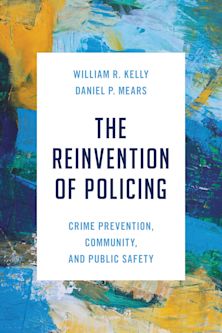Policing Sex Crimes
Policing Sex Crimes
This product is usually dispatched within 1 week
- Delivery and returns info
-
Free CA delivery on orders $40 or over
Description
Policing Sex Crimes offers an overview of the affordances and difficulties of investigating and responding to sex crimes in contemporary digital society. The simplest to most complex sex crimes investigations can (and often do) have a digital component. Such a digital society creates a number of inter- and intra-organizational challenges in terms of investigation of sex offenses and response to victims of sex crimes. In the proposed text, the authors elucidate laws defining sex crimes across international contexts and examine the different ways nation states have responded to digital sex crimes and related digital communication technologies via laws, policies, and practices. They draw on 70 interviews with sex crime investigators to document the effects of digital sex crimes on the policing profession and the broader police organizations that sex crime investigators work. Lastly, they explore how victims are interpreted by police officers and the challenges they face achieving justice in the wake of sexual victimization.
Table of Contents
Chapter 1. Introduction
Chapter 2. Sex Crimes, Law, and Technology
Chapter 3. 'This Isn't Your Father's Police Force': Digital Evidence in Sex Crime Investigations and the Need for Digital Policing
Chapter 4. “Society Wants to See a True Victim”: Police Interpretations of Victims of Sexual Violence
Chapter 5. Collaborative Policing and Networked Responses to Victims of Sex Crimes
Chapter 6. Cynicism, Dirty Work, and Policing Sex Crimes
Chapter 7. Conclusion
References
About the Authors
Product details
| Published | Sep 09 2022 |
|---|---|
| Format | Hardback |
| Edition | 1st |
| Extent | 130 |
| ISBN | 9781538159484 |
| Imprint | Rowman & Littlefield |
| Illustrations | 1 tables; |
| Dimensions | 237 x 158 mm |
| Series | Applied Criminology across the Globe |
| Publisher | Bloomsbury Publishing |
Reviews

ONLINE RESOURCES
Bloomsbury Collections
This book is available on Bloomsbury Collections where your library has access.


































